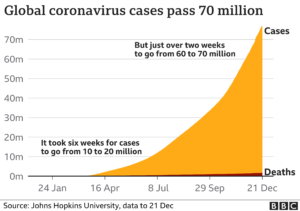Part one of two.
Pretty much everyone was pleased to see 2020 come to an end.
We’ve had to endure a pandemic that seems to be growing worse by the day … an economic lockdown that destroyed millions of jobs and thousands of businesses … widespread protesting, rioting and looting … a contentious presidential election in which the current president refuses to accept defeat.
Will 2021 bring an end to the pandemic? Will we see world peace? Or, even more unlikely, bipartisanship? Or will everything be even worse than in 2020?
No one knows. But there are still plenty of potential negatives ahead of us. And, in retrospect, not everything about 2020 was bad.
Seeing the Good in 2020
Look hard enough at the dark clouds of 2020 and you’ll find silver linings.
The pandemic has killed 1.6 million people worldwide and counting, but 51 million have recovered. Millions of people lost their jobs, but millions already have been rehired. The economy plunged, but it has been enjoying a record recovery. The nation became more politically divided than ever, and yet voters split their votes, electing a Democratic president and adding more Republicans to Congress.
President Trump is disliked by many. As we’ve noted, many consider him to be a bully, a liar, a philanderer and a narcissist. We’ve even heard people say President Trump is responsible for the 300,000 American deaths resulting from COVID-19. And he’s made some outrageous statements about the disease.
But he also spearheaded the creation of, and management of, Operation Warp Speed, which has remarkably driven the development of at least three effective vaccines, two of which are already being administered to millions of Americans.
It typically takes at least a decade to develop and receive approval for a new vaccine. Yet Operation Warp Speed, which was created in May, already has eight vaccines in human trials.
Media have been quick to criticize America for its failure to stop the spread of COVID-19, but American companies, not surprisingly, are leading the way in the development of vaccines. Pfizer (and British partner BioNTech SE) developed the first approved vaccine, which was found to be more than 90% effective in human trials. It was the first vaccine anywhere approved for emergency use.
Meanwhile, Moderna has received emergency approval for its vaccine, which was 95% effective in human trials, and several other vaccines are not far behind. About 20 million doses were projected to be delivered by the end of December. The U.S. government has ordered 200 million doses to date and has an option to purchase up to an additional 300 million doses.
How does America’s response to COVID-19 compare with its response to previous pandemics? During the HH1N1 pandemic, from April 12, 2009 to April 10, 2010, 60.8 million Americans were infected, with 274,304 hospitalizations and 12,469 deaths, the CDC estimated. Congress appropriated $6.75 billion to fight pandemic flu, including H1N1, and that was that.
For COVID-19, Congress appropriated $2.3 trillion through the Coronavirus Aid, Relief, and Economic Security Act (CARES) after previously appropriating $8.3 billion in emergency funding. A third package, the Families First Coronavirus Response Act (FFCRA), has an estimated cost of $192 billion. And just before Christmas, Congress negotiated additional funding of about $900 billion.
Saving Lives, Creating Wealth
The COVID-19 vaccines will not only save lives, they have also helped to drive the stock market to new records — even as the number of new COVID-19 infections is also breaking records. In a very good year, stocks may gain 20%. As the year ended, the Nasdaq Index was up more than 40%.
The economy, likewise, performed remarkably well in 2020. Following a Q2 pandemic dip of 31.4%, the economy grew by a record 33.1% in Q3.
In comparison, for the eight years after The Great Recession, which shrank the economy by 4.3%, the economy grew at an average rate of just 2.3%. Even though The Great Recession lowered the benchmark for growth, the economy grew at a rate that was a full percentage point lower than the 3.3% average rate of growth we’ve enjoyed since World War II ended.
Of course, it helped that the Federal Reserve Board kept interest rates at zero, pledged to continue to do so and developed its own banking system. And Congress helped by passing legislation providing trillions toward fighting the pandemic and reversing its economic impact.
But President Trump’s tax reform and deregulation efforts also helped. Without deregulation, the U.S. Food and Drug Administration would be reviewing COVID-19 vaccines for years without approving one.
Arab Nations Recognizing Israel
While the trade deal that President Trump negotiated with China President Xi Jinping became moot when China unleashed COVID-19 on the rest of the world, other international efforts paid off, in spite of “America First” rhetoric.
With help from the Trump Administration, six Arab nations now recognize Israel and could work with Israel to thwart the desires of Iran.
“The United Arab Emirates and Bahrain forged diplomatic relations with Israel in September, uniting against Iran in a U.S.-brokered deal that marked a broader diplomatic realignment in the Middle East,” The Wall Street Journal reported.
“A month later Sudan agreed to normalize ties, after the U.S. promised to take it off a list of countries designated state sponsors of terrorism. In December, Morocco became the fourth Arab state to agree to opening diplomatic relations with Israel, in return for the U.S. recognizing its sovereignty over the disputed Western Sahara region.”
Egypt and Jordan also have full diplomatic relations with Israel.
So in 2020, we’ve seen the warp-speed development of COVID-19 vaccines, a similarly rapid recovery of the economy, a stock market with positive gains and greater progress toward peace in the Middle East than we’ve seen in decades.
2020 wasn’t really so bad, was it?

